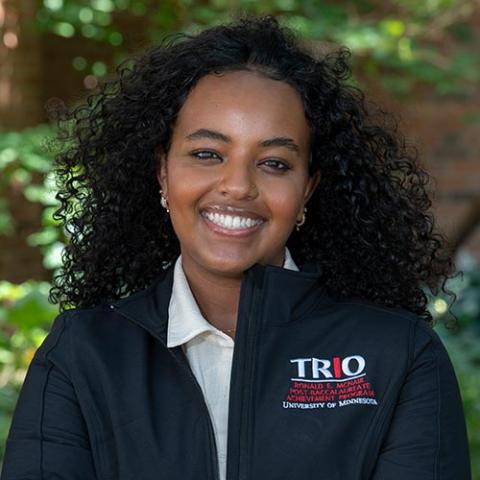McNair Scholar 2022 - Jasmine Adam
Jasmine Adam is a junior at the University of Minnesota majoring in urban studies with minors in population studies, public health, and landscape architecture. Her research interests include urban design, international urban development & issues, housing inequality, and the connections between the educational system & mass incarceration for Black and Brown youth.
Quote from Jasmine Adam

"My dream is to obtain my Ph.D. in Urban & Regional Planning and to teach at a high-level research university researching the connections between our educational system and mass incarceration. I also want to work internationally with developing counties on rising urban issues and being a global leader."
Research project
What is the relationship between comprehensive plans and fast-food destinations in North Minneapolis?
Abstract: Across American Cities, there is substantial evidence of Black neighborhoods being disproportionately exposed to fast food outlets. Although there are many explanations for why there is an oversaturation of fast-food restaurants in Black neighborhoods, the relationship between comprehensive plans and fast-food destinations is unclear. This paper will investigate the answer to the question of how did comprehensive plans lead to fast food destinations in North Minneapolis? Developing an analysis of three archival documents comparing them by years and seeing how things change in North Minneapolis through the lens of fast food. Focusing on West Broadway, investigating how the street has changed historically through land use maps. Evaluating the history of urban planning through a food justice lens. As well as ownership of land and space.
Faculty mentor
Fernando Burga an Assistant Professor at the Humphrey School of Public Affairs. His research focuses on the incorporation of immigrant populations into planning and urban food systems. Fernando's work is informed by a reflexive inquiry into the ethics of knowledge and the use of qualitative research; the application of design building awareness, harness data, and enabling urban planning and public policy advocacy; and a commitment to engage community actors who are disenfranchised from the fields of planning and public policy due to their race, class, and citizenship status. Coming from a background in architecture his experience includes the designing of Hope VI communities, mixed-use infill developments, transit-oriented developments, and military communities. He received his doctorate degree in city and regional planning from the University of California, Berkeley in 2013. He has won numerous awards and is currently writing a book on Cuban American empowerment and planning in Miami, Florida.